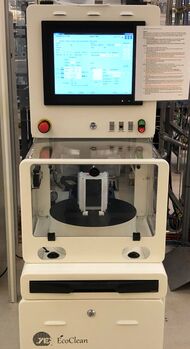Difference between revisions of "Plasma Clean (YES EcoClean)"
(updated SOP link) |
(added etch method & applications) |
||
| Line 10: | Line 10: | ||
==About== |
==About== |
||
| + | The YES EcoClean system is an ICP downstream asher used for the removal of resist and other organics. |
||
| − | The YES EcoClean system is an ICP downstream asher used for the removal of resist and other organic. 4" wafers are cassette loaded or smaller samples are loaded onto 4" carriers into the system. Samples can be heated from ~120C to 200C by controlling the sample height via the lift pins during process, while being exposed to ICP-cracked oxygen to remove organic materials. The excitation of the oxygen is done remotely and a baffle keeps ions from reaching the surface. Radicals diffuse and are scattered across the wafer surface for efficient cleaning and PR removal without any ion damage. Resist etch rates of multiple microns per minute can be achieved. See the process pages below for etch recipes for various resist removal recipes. |
||
| + | 4" wafers are cassette loaded or smaller samples are loaded onto 4" carriers into the system. |
||
| + | Samples can be heated from ~120°C to 200°C by controlling the sample height via the lift pins during process, while being exposed to ICP-cracked oxygen to remove organic materials. |
||
| ⚫ | |||
| + | === Etch Method === |
||
| ⚫ | |||
| + | The excitation of the oxygen is done remotely and a baffle keeps charged ions from reaching the surface, leaving primarily neutral Oxygen radicals in the gas mixture. Radicals diffuse and are scattered across the wafer surface for efficient cleaning and PR removal without any ion damage. This behaves like a wet-etch with reactive Oxygen. No ion bombardment at all, so isotropic (omni-directional) etch - attacks sidewalls just as fast as top surfaces. Heat is used to increase reaction rate. Treat this as a purely chemical process, accelerated by heat (Arrhenius plot - rate goes up exponentially with temperature). |
||
| + | |||
| + | === Applications === |
||
| + | Resist etch rates of multiple microns per minute can be achieved. |
||
| + | |||
| + | Use this where you know a purely chemical etch will suffice, for example PR etching. PR stripping is fast and cassette loaded. Works best for PR that hasn't been significantly changed (eg. Chlorinated, or Polymerized - in these cases some small residue can be left.) - follow up with [[Ashers (Technics PEII)|PEii Technics]] etch to remove more stubborn residues. |
||
| + | |||
| + | See the process pages below for etch recipes for various resist removal recipes. |
||
==Documentation== |
==Documentation== |
||
*[https://wiki.nanotech.ucsb.edu/w/images/f/f8/YES_SOP_Rev_C.pdf YES Plasma Strip System Standard Operating Procedure] |
*[https://wiki.nanotech.ucsb.edu/w/images/f/f8/YES_SOP_Rev_C.pdf YES Plasma Strip System Standard Operating Procedure] |
||
| ⚫ | |||
| + | |||
| + | == Recipes == |
||
| ⚫ | |||
Revision as of 10:22, 23 June 2021
| ||||||||||||||||||||
About
The YES EcoClean system is an ICP downstream asher used for the removal of resist and other organics.
4" wafers are cassette loaded or smaller samples are loaded onto 4" carriers into the system.
Samples can be heated from ~120°C to 200°C by controlling the sample height via the lift pins during process, while being exposed to ICP-cracked oxygen to remove organic materials.
Etch Method
The excitation of the oxygen is done remotely and a baffle keeps charged ions from reaching the surface, leaving primarily neutral Oxygen radicals in the gas mixture. Radicals diffuse and are scattered across the wafer surface for efficient cleaning and PR removal without any ion damage. This behaves like a wet-etch with reactive Oxygen. No ion bombardment at all, so isotropic (omni-directional) etch - attacks sidewalls just as fast as top surfaces. Heat is used to increase reaction rate. Treat this as a purely chemical process, accelerated by heat (Arrhenius plot - rate goes up exponentially with temperature).
Applications
Resist etch rates of multiple microns per minute can be achieved.
Use this where you know a purely chemical etch will suffice, for example PR etching. PR stripping is fast and cassette loaded. Works best for PR that hasn't been significantly changed (eg. Chlorinated, or Polymerized - in these cases some small residue can be left.) - follow up with PEii Technics etch to remove more stubborn residues.
See the process pages below for etch recipes for various resist removal recipes.
Documentation
Recipes
Recipes > Dry Etching > Oxygen Plasma > YES Ecoclean Recipes
